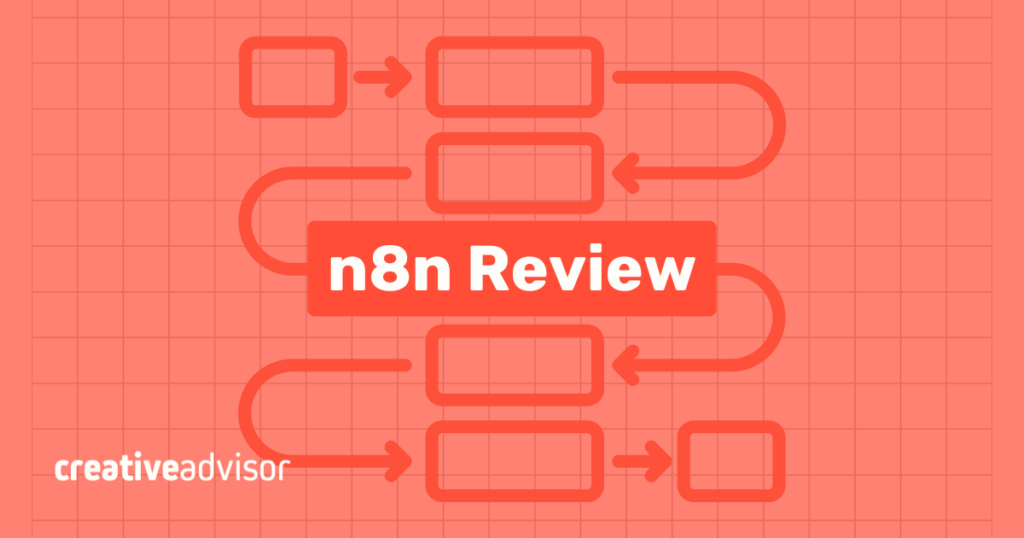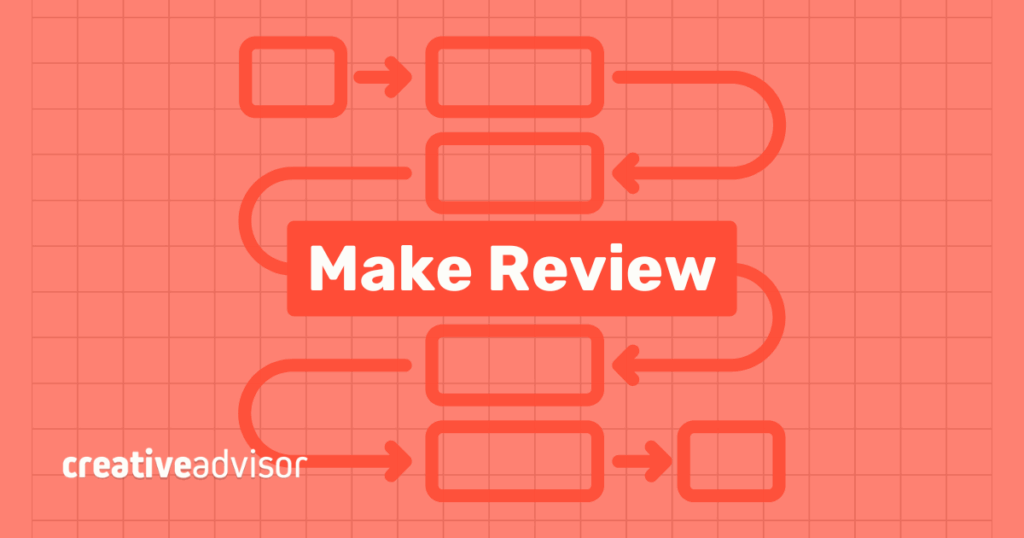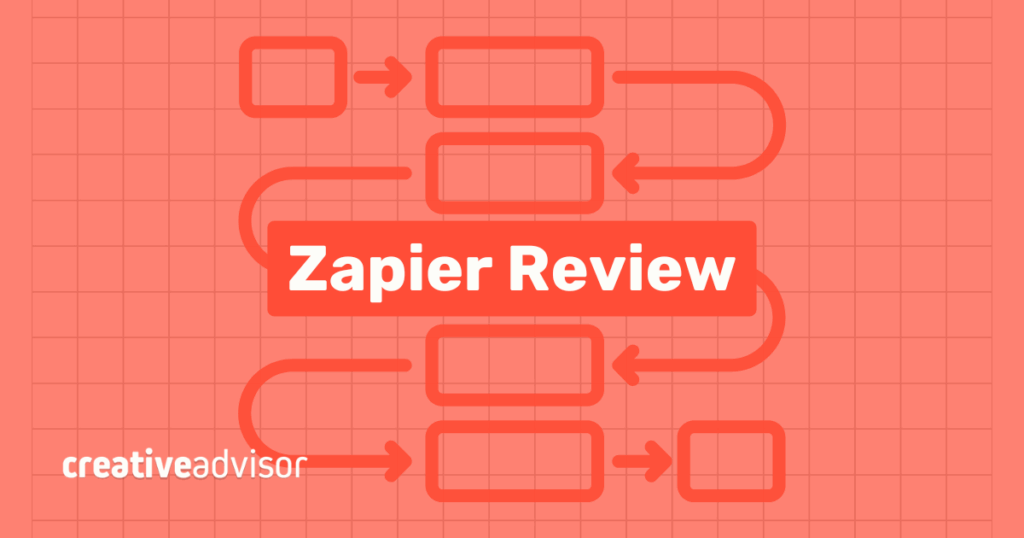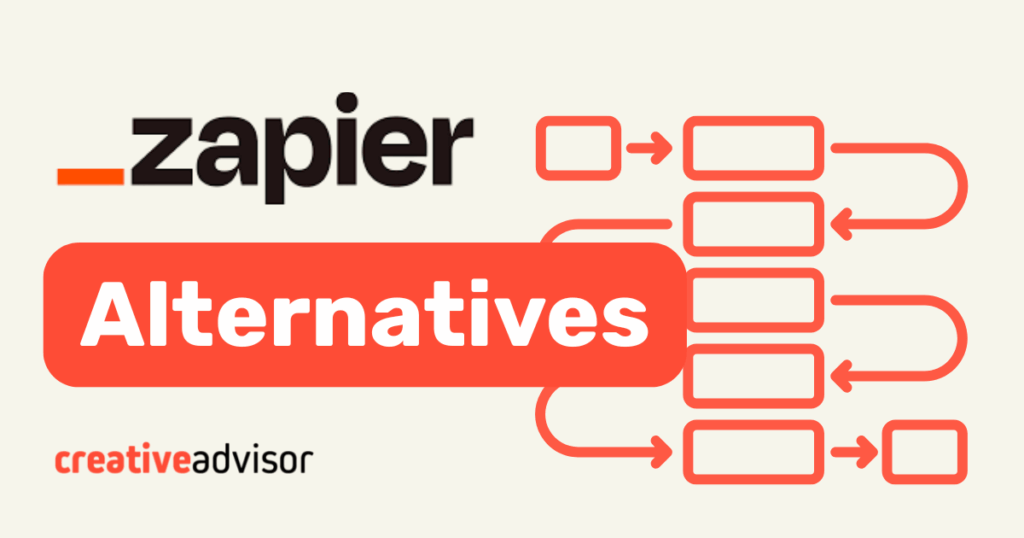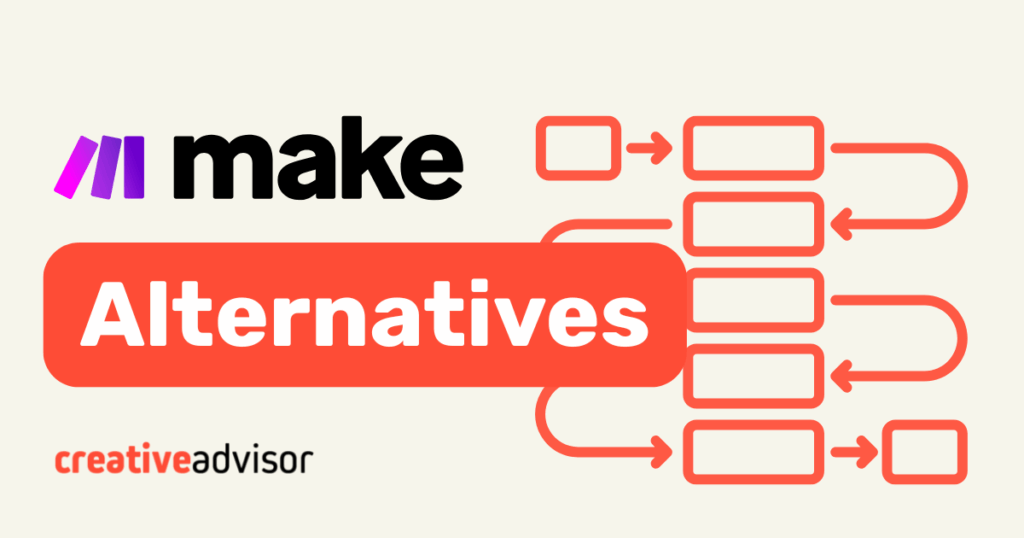
OVERVIEW
n8n stands out as a flexible, open-source automation platform built for users who want full control over their workflows. It combines visual design with technical depth, giving teams the freedom to automate complex processes without rigid limits. For developers, IT professionals, and technically inclined teams, it offers exceptional value through customization, self-hosting, and fair pricing at scale.
However, n8n is not the simplest option. The platform requires time and technical comfort to master, and support is community-driven unless you’re on a higher-tier plan. For businesses that prioritize plug-and-play automation or direct vendor support, tools like Zapier or Make may be a smoother fit.
BEST FOR:
Pros and cons
Pros
- Open-source and self-hosted. Gives teams full control over data and infrastructure. Ideal for privacy-focused or regulated environments.
- Highly flexible logic. Handles advanced workflows with conditional branching, loops, and error handling that go beyond typical “if-this-then-that” tools.
- Code-friendly customization. Lets developers write JavaScript or Python snippets, build custom nodes, and extend integrations freely.
- Broad integration coverage. Supports 1,200+ pre-built nodes and connects to any API through HTTP requests.
- Unlimited workflow steps. Pricing is based on executions, not step count. On higher tiers, workflows keep running if you exceed your quota, and n8n bills overages rather than halting your automations.
Cons
- Steeper learning curve for non-technical users. The interface works best for users comfortable with APIs and JSON, making it less approachable than no-code tools like Zapier or Make.
- Troubleshooting may require deep workflow inspection. Complex automations often need log reviews, node-by-node testing, or JSON checks to resolve errors.
- Maintenance required for self-hosting. Managing servers, updates, and backups adds DevOps overhead.
- Technical support is limited on basic plans. Standard users rely on community forums, while dedicated support with SLAs is available only for Enterprise customers.
Key features and ease of use
n8n’s feature set is built around flexibility and depth. It combines visual workflow design, advanced automation logic, and full control over integrations. Together, these features make it powerful enough for technical users while still accessible to teams that want to scale automation at their own pace.
Visual workflow builder
n8n’s drag-and-drop builder lets users map automations step by step. Each node represents an action or trigger, and workflows can include conditional logic, loops, and parallel paths. A live execution panel shows how data moves between steps, making testing and debugging easier.
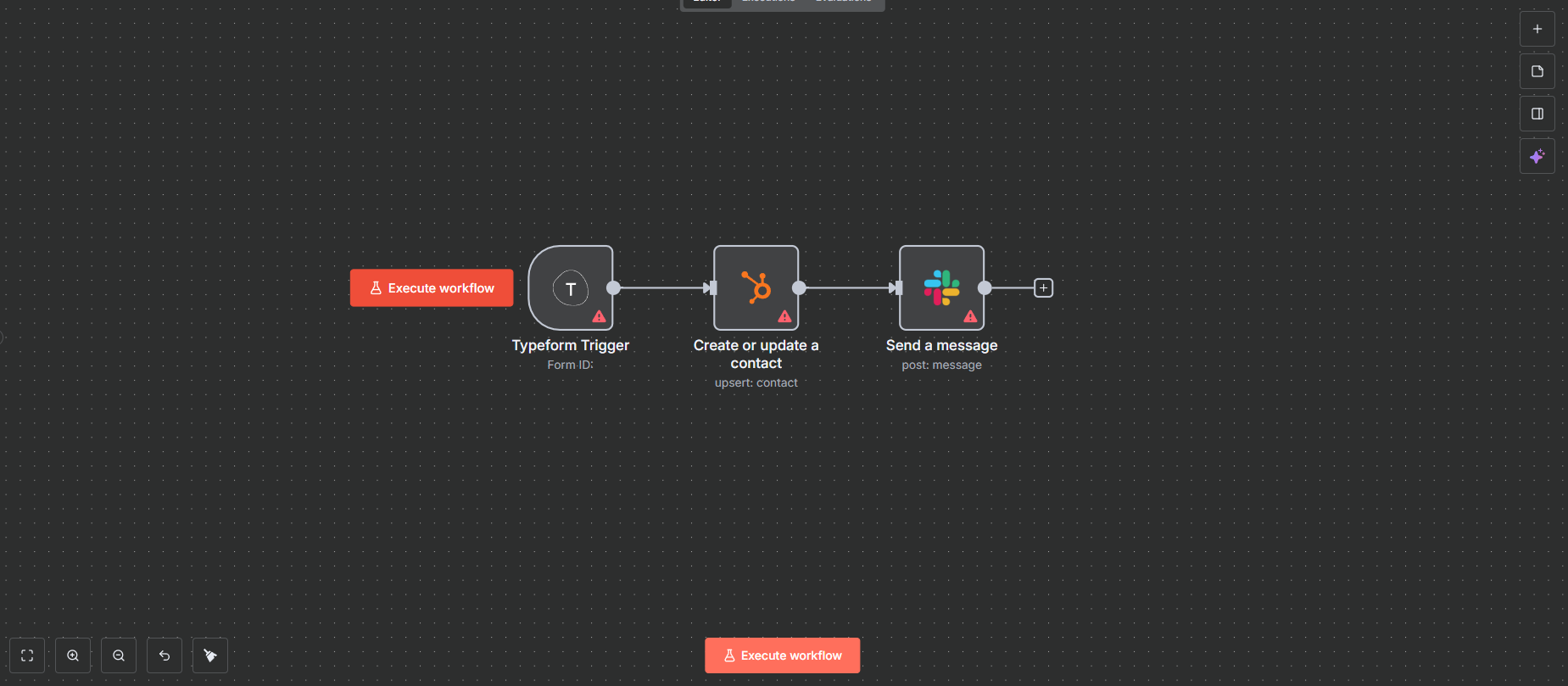
Custom code and extensibility
n8n supports custom logic through JavaScript and Python nodes, allowing users to transform data or extend workflows beyond standard integrations. Developers can also build custom nodes or plugins to connect internal tools, giving teams full control over how automations behave.
Advanced workflow capabilities
n8n supports complex automations with multiple triggers, conditional branches, and error handling. Workflows can be scheduled, triggered by webhooks, or run in real time. Recent updates also include AI agent nodes that integrate large language models into workflows for classification, routing, or content generation.
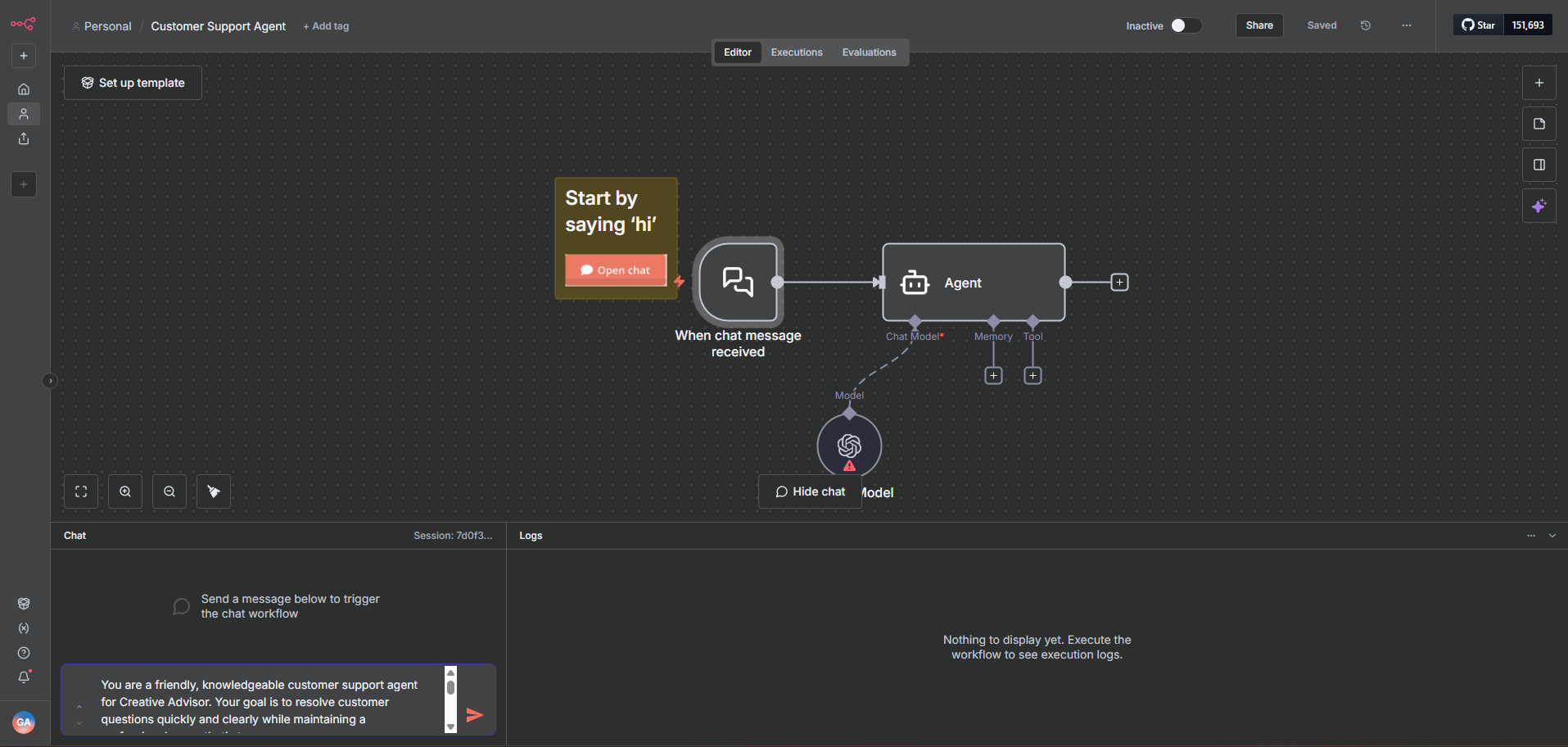
Ease of use
n8n’s interface is clean and logical but designed with technical users in mind. Cloud setup is quick, while self-hosting requires more configuration and maintenance. Once workflows are built, testing and monitoring are straightforward. Beginners may find data mapping and JSON handling challenging at first.
n8n fits teams that value control and flexibility in their automations, especially those who want to build complex workflows on their own terms. It can also suit curious users exploring automation, provided they’re open to a bit of technical learning along the way.
Integrations
n8n connects with more than 1,200+ apps and services, covering everything from CRMs and databases to productivity tools and AI platforms. Popular integrations include Slack, Google Sheets, HubSpot, Shopify, and Notion. These connections let users automate data flow across departments, such as syncing leads from a web form into a CRM, updating project boards, or sending alerts to a team chat in real time.
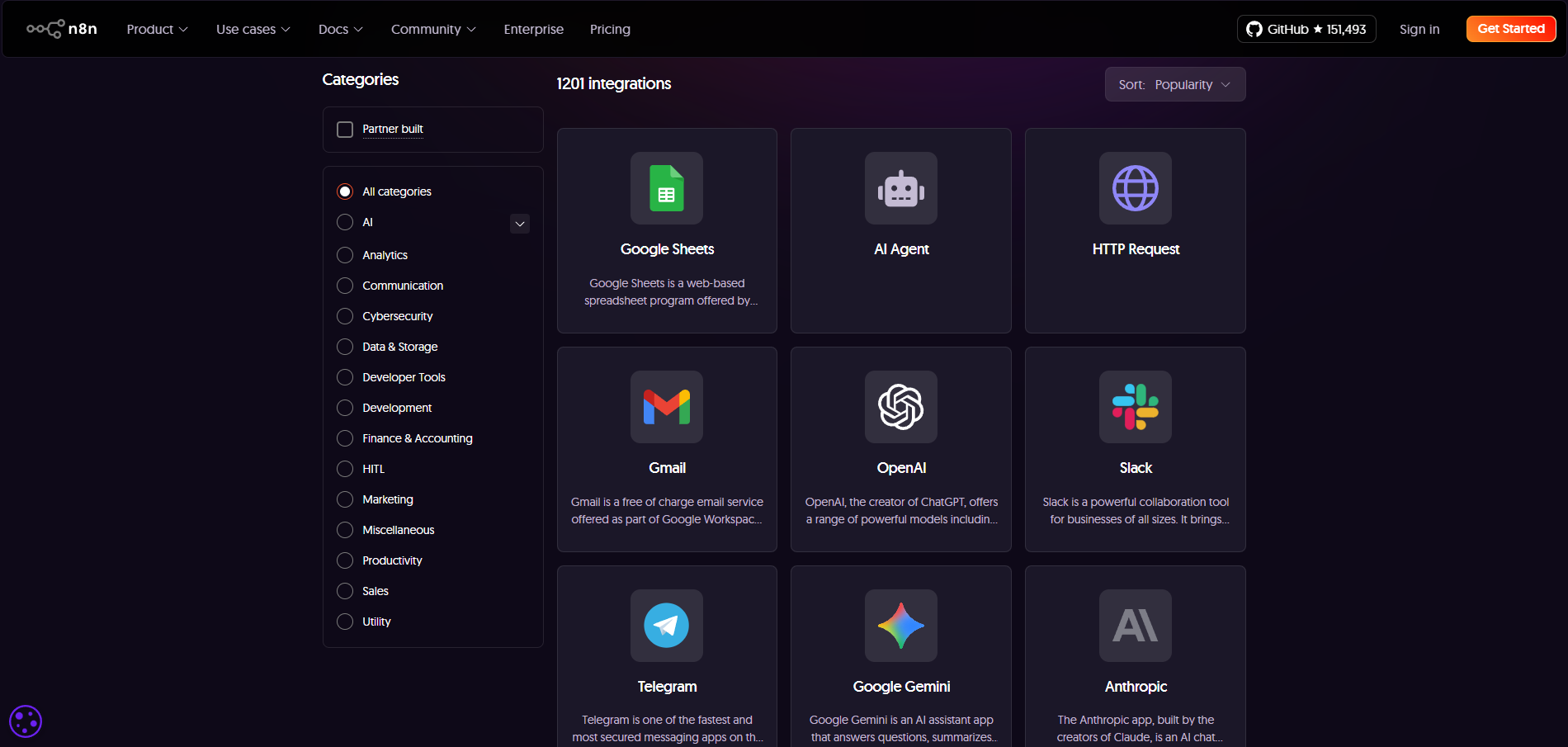
Common integration categories
- Productivity: Slack, Microsoft Teams, Google Workspace
- CRM and sales: Salesforce, HubSpot, Pipedrive
- Marketing: Mailchimp, ActiveCampaign
- Project management: Asana, Trello, Monday.com
- E-commerce: Shopify, WooCommerce
- Developer tools: GitHub, Jira
Depth and reliability
Each app integration includes both triggers and actions, allowing workflows to start from in-app events or push data to external tools. Core integrations like Google Workspace, Salesforce, and MySQL are stable and well documented, while niche connectors are often maintained by the open-source community. This balance keeps n8n’s library reliable for common business tools while still expanding quickly through community input.
Custom flexibility
For apps that aren’t supported, users can connect to almost any web API using the built-in HTTP request node. This removes integration limits and lets teams automate with proprietary or internal systems. Technical users can go further by building custom nodes or adding code snippets to tailor workflows, giving n8n an edge over tools that restrict integrations to prebuilt templates.
Our featured partners
n8n pricing tiers
n8n uses a usage-based pricing model built around workflow executions instead of per-user or per-step fees. This makes it flexible for teams running complex automations or collaborating across multiple users. Businesses can choose between self-hosted and cloud-hosted versions depending on their needs and technical setup.
| Plan | Annual price (per month) | Monthly price | Includes | Best for |
|---|---|---|---|---|
| Free (self-hosted) | $0 | $0 | Unlimited workflows and steps, all core integrations, full open-source access. | Developers or small teams comfortable managing their own servers. |
| Starter (cloud) | $20/month | $24/month | 2,500 executions, 1 shared project, 5 concurrent runs, all integrations. | Individuals or small teams testing automation or running light workloads. |
| Pro (cloud) | $50/month | $60/month | Starts at 10,000 executions, 3 projects, 20 concurrent runs, 7 days of workflow logs, role-based access. | Small businesses or developers managing moderate automation loads. |
| Business (self-hosted license) | $667/month | $800/month | Starts at 40,000 executions, 6 projects, 30-day logs, SSO/SAML, Git version control, multiple environments. | Mid-sized companies needing security, collaboration, and compliance. |
| Enterprise (cloud or self-hosted) | Custom | Custom | Custom amount of executions, dedicated support, 365-day logs, priority SLA, custom data residency. | Large organizations with strict compliance and high-volume automation needs. |
Only paying for executions helps small and mid-sized teams keep costs predictable when workflows are efficient, though costs can rise faster than expected if execution counts spike.
Because n8n doesn’t impose hard task caps, workflows keep running even during high-usage periods, though additional executions may incur overage charges.
Compared to tools like Zapier and Make, n8n often proves more cost-effective for advanced users. Zapier’s per-task pricing can add up quickly for complex, multi-step workflows, while n8n allows unlimited steps per execution. Make offers low-cost plans but lacks the self-hosting option that appeals to technical teams managing large or sensitive workloads.
Compliance and security
Security and compliance are essential for any automation platform handling business or customer data. n8n takes a flexible approach, allowing teams to either self-host the platform or use its managed cloud service. Its open-source model also gives users transparency and control over how their data is handled, a key factor for teams in regulated industries.
Security features
n8n includes several measures to help protect user data across both its cloud and self-hosted deployments. These controls cover how data is stored, transferred, and accessed within automated workflows.
- Data encryption. All data transmitted through n8n Cloud is protected with HTTPS/TLS encryption. Data at rest is stored securely on Azure servers in Frankfurt, Germany, while self-hosted users can apply their own encryption and storage policies.
- Authentication and access control. Cloud users can enable two-factor authentication, and higher plans support SSO and SAML for enterprise login systems. Role-based access controls help limit workflow access to authorized users only.
- Audit logs and monitoring. Workflow execution logs track activity and results, with retention varying by plan. Enterprise plans can stream these logs to external monitoring tools for deeper auditing.
- Error handling and recovery. Built-in error triggers help detect failed executions and alert teams. Cloud hosting uses Azure’s redundancy for uptime reliability, with a 99.9% availability commitment on managed plans. Self-hosted users can manage their own backup and recovery strategy.
Compliance and certifications
n8n’s security framework aligns with major global standards, focusing on transparency and control rather than restrictive vendor policies. Its cloud platform and documentation reflect compliance with widely recognized privacy and security frameworks.
- GDPR compliance. n8n is based in Europe and fully adheres to GDPR requirements. Data from n8n Cloud has Standard Contractual Clauses in place for international data transfers. Self-hosted deployments can meet local data residency requirements by choosing where data is stored and processed.
- SOC 2 and SOC 3 reports. n8n provides a public SOC 3 report for transparency, and enterprise customers can request access to the SOC 2 report.
- HIPAA readiness. While not HIPAA-certified by default, n8n can be deployed in a HIPAA-compliant environment through self-hosting. Organizations handling sensitive data can configure their own encrypted databases, access controls, and audit logging to meet internal standards.
- Data privacy and control. Users maintain ownership of their data. Credentials are stored encrypted and telemetry collection can be disabled. n8n only accesses workflow metadata (not actual content) and does not act as data controller for self-hosted instances.
- Data residency options. n8n Cloud hosts data in the EU, specifically on servers in Frankfurt, Germany. Self-hosting gives you full control over where your workflows run and data is stored.
Community and customer support
n8n’s support model blends community-driven help with dedicated assistance for business and enterprise customers. Most users rely on the active open-source community, which contributes templates, answers questions, and helps troubleshoot issues. Paid tiers add structured support with guaranteed response times.
Support options
- Community forum. The main hub for troubleshooting and workflow advice, moderated by staff and contributors.
- Email and ticket support. Available for business and enterprise customers, while basic users rely on documentation and the forum.
- Priority response Enterprise plans include SLA-backed response times and customer success management.
- Documentation. n8n’s official guides and knowledge base cover setup, nodes, and advanced use cases.
- Response times. Community responses often arrive within hours, reflecting strong engagement.
Community resources
- Open-source contributions. Developers share custom nodes, templates, and workflow examples that extend functionality.
- Workflow templates. Thousands of ready-to-use examples help users build and adapt automations quickly.
- Learning content. Webinars, tutorials, and videos cover everything from onboarding to advanced workflows.
- Active spaces. The n8n community spans a public forum, Discord server, and subreddit.</li.
- Transparency. Public changelogs and GitHub discussions track updates and feature requests.
Overall, n8n’s support ecosystem favors self-guided users who enjoy community collaboration, with scalable options for teams that need enterprise-grade reliability.
Customer reviews
n8n holds strong ratings across major platforms, including 4.8/5 on G2 and 4.6/5 on Capterra as of October 2025. Feedback is largely positive among developers and technical teams who prioritize flexibility over plug-and-play simplicity. Most reviews describe n8n as powerful once configured, with some technical knowledge required to unlock its full potential.
What people like
- Customization and control. Reviewers often praise n8n’s flexibility and ability to handle complex workflows through code or custom nodes.
- Self-hosting option. Many users appreciate the freedom to deploy n8n on their own infrastructure for full data control.
- Value for cost. Compared to competitors like Zapier, n8n is frequently described as more affordable at scale.
- Community support. Many users praise the responsiveness of n8n’s forum and community contributors.
- Integration range. Users highlight the large number of supported apps and the option to connect to almost any API.
Where people see challenges
- Learning curve. Beginners often mention that setup and troubleshooting can feel complex without prior technical experience.
- Interface familiarity. Some users find the visual editor less intuitive than tools like Make or Zapier, especially early on.
- Documentation depth. While improving, a few reviewers cite that documentation could be clearer for advanced configurations.
- Performance scaling. Heavier workloads occasionally require infrastructure tuning when self-hosted.
Methodology: How we rate automation platforms
The data-driven approach behind Creative Advisor's platform recommendations.
Star rating categories
Our criteria prioritize the factors that weigh most heavily on platform capability and user satisfaction.
We evaluate the breadth and depth of available connections, assessing whether platforms offer extensive app coverage, advanced features like webhooks and custom APIs, and thorough documentation that enables users to build complex workflows without limitations.
We assess how intuitive the interface is for new users, how quickly teams can onboard, and whether the platform facilitates smooth collaboration across team members. We also assess essential workflow features like conditional branching, advanced scheduling options, and robust error handling with retry capabilities.
We examine whether pricing structures are transparent and competitive, and whether plans scale efficiently as workflow complexity and usage grow.
We verify that platforms meet or exceed industry security standards and maintain transparent, accessible policies around data protection and compliance certifications.
We evaluate the strength of user communities, quality of educational resources, and responsiveness of customer support across multiple channels.
We look for platforms that consistently introduce cutting-edge features, demonstrate a clear product roadmap, and publicly share their commitment to advancing automation technology.
We assess platform uptime, performance speed under various load conditions, and transparency around service status and incident reporting.
We analyze verified user feedback across multiple review platforms, looking for consistent satisfaction patterns and evaluating sentiment.
Creative Advisor rigorously evaluates automation platforms across more than 10 technology providers. Our review process involves gathering over 40 data points, verifying information through company websites and public documentation, and often testing the platforms directly. Our editorial team thoroughly fact-checks all findings and keeps ratings current with regular updates throughout the year.
Article sources
Creative Advisor uses primary sources to verify our claims. We thoroughly fact-check editorial content to ensure the information you're reading is up-to-date and accurate.
- "Using the Code node". n8n.io. Reviewed on Oct. 22, 2025.
- "Security at n8n". n8n.io. Reviewed on Oct. 22, 2025.
- "N8n server locations" [Forum]. n8n.io. Reviewed on Oct. 22, 2025.
- "n8n reviews" [Review site]. G2. Reviewed on Oct. 22, 2025.
- "n8n.io reviews" [Review site]. Capterra. Reviewed on Oct. 22, 2025.
